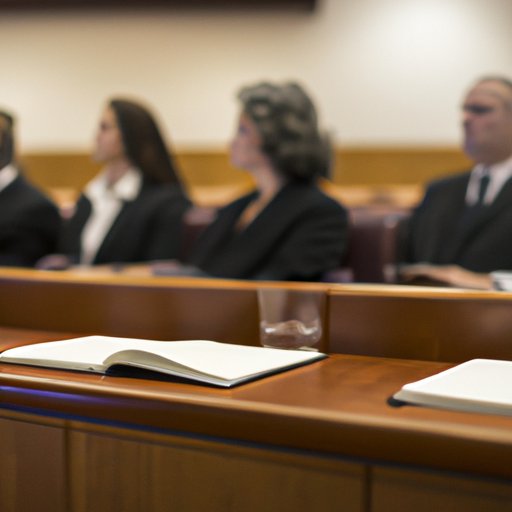
An Overview of the Trial Process
A trial is a formal legal proceeding that takes place before a court of law. It is a process by which a decision is made about whether or not a person has committed a crime or is liable for civil damages. Trials are designed to be fair and impartial, and they provide a forum for both sides of a dispute to present their arguments and evidence.
Trials can be divided into two main categories: criminal trials and civil trials. Criminal trials involve accusations of criminal wrongdoing and typically result in a conviction or acquittal, while civil trials involve disputes between two or more parties and typically result in a judgment for one side or the other.

Explaining the Different Types of Trials
Criminal trials involve the state or federal government prosecuting an individual for breaking a law. The defendant is presumed innocent until proven guilty beyond a reasonable doubt. If found guilty, the defendant may face fines, imprisonment, or other forms of punishment. The prosecution must prove the defendant’s guilt beyond a reasonable doubt, while the defense must raise doubts about the prosecution’s case.
Civil trials, on the other hand, involve disputes between two or more private parties. These cases typically involve disagreements over money or property. The outcome of a civil trial is usually a judgment for one side or the other, such as awarding damages to the plaintiff or dismissing the case. Unlike criminal cases, the burden of proof in civil cases is lower; the plaintiff must only prove their case by a “preponderance of the evidence.”

Examining the Role of the Judge and Jury in a Trial
The judge is the highest authority in the courtroom and is responsible for maintaining order and making sure the trial is conducted according to the law. The judge also has the power to make rulings on questions of law and to determine the admissibility of evidence.
The jury is a group of citizens who are chosen to hear evidence and decide whether the defendant is guilty or not guilty. Juries are comprised of 12 people and must reach a unanimous verdict. The jury is not allowed to consider anything outside of the evidence presented at trial, and must rely solely on the facts presented in court.
Exploring the Role of Attorneys in a Trial
Attorneys play a critical role in a trial. The prosecutor is the attorney representing the state or federal government in a criminal trial. The prosecutor is responsible for presenting the case against the defendant and must prove the defendant’s guilt beyond a reasonable doubt.
The defense attorney represents the defendant in a criminal trial and is responsible for challenging the prosecutor’s evidence and raising doubts about the prosecution’s case. In a civil trial, the plaintiff’s attorney is responsible for presenting the case in favor of the plaintiff, and the defendant’s attorney is responsible for challenging the plaintiff’s evidence and raising doubts about the plaintiff’s case.
Exploring the Role of Witnesses in a Trial
Witnesses are individuals who have knowledge about the facts of a case and can provide information that is relevant to the trial. Witnesses can be called to testify by either the prosecution or the defense. Their testimony is subject to cross-examination, which allows the opposing side to ask questions about the witness’s testimony.
Witnesses can be divided into two categories: expert witnesses and lay witnesses. Expert witnesses are individuals who have specialized knowledge about a particular topic related to the case. Lay witnesses are individuals who have personal knowledge about the facts of the case.
Outlining the Different Phases of a Trial
Once a jury has been selected and sworn in, the trial begins with the opening statements. During this phase, both the prosecution and defense present their versions of the facts of the case. After the opening statements, the presentation of evidence begins. This includes testimony from witnesses, documents, and physical evidence.
Once all the evidence has been presented, the closing arguments begin. During this phase, each side presents its final argument and summarizes the evidence that was presented. After the closing arguments, the jury deliberates and reaches a verdict. Finally, the judge reads the verdict in open court.
Analyzing the Impact of Pre-Trial Motions on the Outcome of a Trial
Pre-trial motions are requests that are made to the court before the trial begins. These requests can include motions to exclude certain evidence or testimony, to dismiss the case, or to change the venue. Pre-trial motions can have a significant impact on the outcome of a trial. For example, if the motion to exclude certain evidence is granted, it could potentially weaken the prosecution’s case or even lead to a dismissal of the charges.
Pre-trial motions can also affect the timing of a trial. If the motion to change the venue is granted, for example, the trial could be delayed while the new venue is prepared.
Conclusion
Understanding how a trial works is essential for anyone involved in the legal system. This article provided an in-depth look at the different types of trials, the roles of the judge and jury, attorneys, witnesses, and pre-trial motions, as well as the various phases of a trial. By understanding the different aspects of a trial, you can ensure that your rights are protected and that justice is served.
(Note: Is this article not meeting your expectations? Do you have knowledge or insights to share? Unlock new opportunities and expand your reach by joining our authors team. Click Registration to join us and share your expertise with our readers.)
